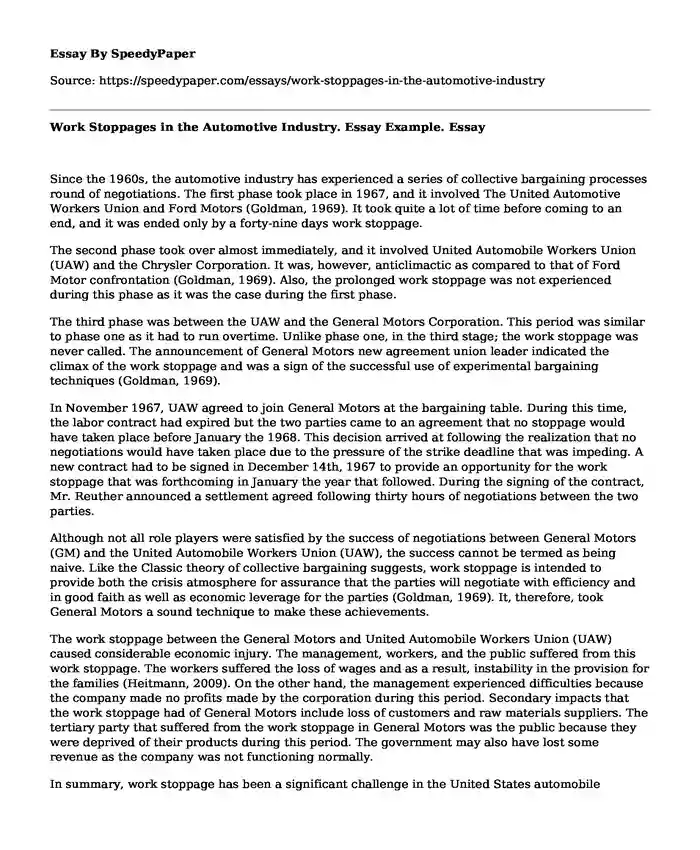
| Type of paper: | Essay |
| Categories: | Automotive industry |
| Pages: | 3 |
| Wordcount: | 600 words |
Since the 1960s, the automotive industry has experienced a series of collective bargaining processes round of negotiations. The first phase took place in 1967, and it involved The United Automotive Workers Union and Ford Motors (Goldman, 1969). It took quite a lot of time before coming to an end, and it was ended only by a forty-nine days work stoppage.
The second phase took over almost immediately, and it involved United Automobile Workers Union (UAW) and the Chrysler Corporation. It was, however, anticlimactic as compared to that of Ford Motor confrontation (Goldman, 1969). Also, the prolonged work stoppage was not experienced during this phase as it was the case during the first phase.
The third phase was between the UAW and the General Motors Corporation. This period was similar to phase one as it had to run overtime. Unlike phase one, in the third stage; the work stoppage was never called. The announcement of General Motors new agreement union leader indicated the climax of the work stoppage and was a sign of the successful use of experimental bargaining techniques (Goldman, 1969).
In November 1967, UAW agreed to join General Motors at the bargaining table. During this time, the labor contract had expired but the two parties came to an agreement that no stoppage would have taken place before January the 1968. This decision arrived at following the realization that no negotiations would have taken place due to the pressure of the strike deadline that was impeding. A new contract had to be signed in December 14th, 1967 to provide an opportunity for the work stoppage that was forthcoming in January the year that followed. During the signing of the contract, Mr. Reuther announced a settlement agreed following thirty hours of negotiations between the two parties.
Although not all role players were satisfied by the success of negotiations between General Motors (GM) and the United Automobile Workers Union (UAW), the success cannot be termed as being naive. Like the Classic theory of collective bargaining suggests, work stoppage is intended to provide both the crisis atmosphere for assurance that the parties will negotiate with efficiency and in good faith as well as economic leverage for the parties (Goldman, 1969). It, therefore, took General Motors a sound technique to make these achievements.
The work stoppage between the General Motors and United Automobile Workers Union (UAW) caused considerable economic injury. The management, workers, and the public suffered from this work stoppage. The workers suffered the loss of wages and as a result, instability in the provision for the families (Heitmann, 2009). On the other hand, the management experienced difficulties because the company made no profits made by the corporation during this period. Secondary impacts that the work stoppage had of General Motors include loss of customers and raw materials suppliers. The tertiary party that suffered from the work stoppage in General Motors was the public because they were deprived of their products during this period. The government may also have lost some revenue as the company was not functioning normally.
In summary, work stoppage has been a significant challenge in the United States automobile industry. Ford Motors, Chrysler Corporation, and the General Motors had had a series of confrontations with the United Automobile Workers Union on the collective bargaining processes. Mr. Reuther seemed to have found a solution to this problem by using a successful bargaining technique that led to the settlement of the work stoppage and satisfaction of the collective bargaining.
References
Goldman, A. L. (1969). Collective Bargaining Without Work Stoppage? Kentucky Law Journal: Law Faculty Scholarly Articles.
Heitmann, J. A. (2009). The automobile and American life. Jefferson, N.C: McFarland & Co.
Cite this page
Work Stoppages in the Automotive Industry. Essay Example.. (2019, Jun 11). Retrieved from https://speedypaper.com/essays/work-stoppages-in-the-automotive-industry
Request Removal
If you are the original author of this essay and no longer wish to have it published on the SpeedyPaper website, please click below to request its removal:
- Free Essay with The Picture of Dorian Gray Analysis
- Essay Example on Coca-Cola Marketing Strategy
- Marketing Essay Example: The Brand Manager
- Essay Sample: Heterosexual Construction and Regulation of Sexuality
- Free Essay in Public Health: Basic Biostatistics: Articles Finding
- Free Essay Sample on the Kate Chopin's Story: The Meaning Of The Storm
- Free Essay Example: Importation of Slavery
Popular categories




